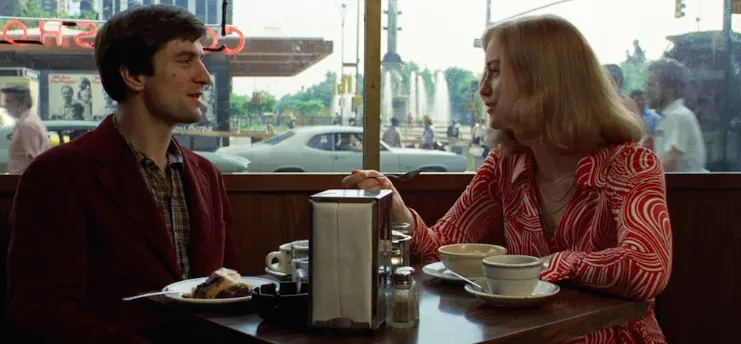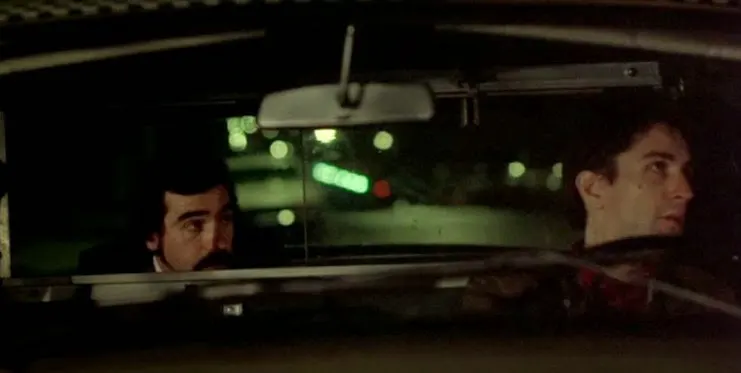Martin Scorsese and Paul Shrader's "Passenger Watching Silhouette"
While watching Wolf Of Wall Street, I couldn’t stop thinking how Scorsese was once truly great. Wolf may have been his biggest commercial hit, but it never reaches for the stars the way Scorsese used to. Still, his career is one of most fascinating of all living directors. He broke onto the scene in the early seventies with Mean Streets and his early trademark ‘cinema of loneliness.’ To me, After Hours seemed a turning point that brought levity, after which the director branched out into a diverse range of genres, all of which he mastered.
Scorsese never paid his dues the way most of his predecessors did. He didn’t move up through the ranks of the studio system from mail boy to director. Instead, with Spielberg, Coppola, Lucas, De Palma and Cimino, he belonged to that generation of great American filmmakers who learned the craft at school, mostly by studying the Europeans, and above all the French nouvelle vague. Scorsese was enamoured with the rebellious style of Godard and Truffaut. Everything was possible. Cinema wasn’t necessarily just about a good story, well told; Scorsese wanted to use the camera as a direct storytelling tool, just like his inspirators from the old world.
LONELINESS - IN THE BEST COMPANY
Taxi Driver looks spectacular, yet feels raw and direct; it has the edge of the newcomer still finding his way. It is brilliant, yet today it sometimes feels experimental and somewhat clunky in its camera moves and edits. Later films show more sophistication and subtlety. More money meant more time for polishing, and so his later films showed less shooting from the gut than those early gems.
Quite unbelievable about Taxi Driver is the sheer amount of stratospheric talent among cast and crew. Actors Robert De Niro, Cybill Shepherd, Jodie Foster, Albert Brooks and Harvey Keitel were surrounded by Michael Chapman (camera), Bernard Herrmann (music) and producers Julia and Michael Phillips to name only a few. If they don’t all ring a bell, IMDB them. You’ll be astounded.
NOT TALKING TO YOU
The obvious movie moment would have been the “Are you talking to me?” scene. I found a few other scenes more interesting, though. When Travis (De Niro) stakes out Betsy (Cybill Shepherd), and then moves to ask her out, his obsessive yet charming determination locks in our interest in his character. After this, Travis’ journey descends rapidly, but because that earlier scene humanised him, we never really see him as a monster.

For those viewers who still struggle to empathise with Travis, screenwriter Paul Schrader brought in the character of The Passenger Watching Silhouette. Suddenly Travis doesn’t seem so bad after all. Now, here’s a real creep for you, played by … the director.

DE NIRO - SCORSESE - LEO
In the tradition of his other mentor, Alfred Hitchcock, Scorsese often appears in his own movies with brief cameos. In Taxi Driver, he shines for a full four minutes. Scorsese’s character is one of the most memorable passengers in Travis’ cab and his performance keeps an incredible tension. For a short while it seems as if Scorsese typecast himself as the highly strung fast-talker. But then the character reveals himself as a racist cuckold, watching the silhouette of his wife in the window of her lover’s apartment. And he is going to kill her. “You know who lives there? A nigger lives there.”
This is an amazing movie moment, where the director and his fetish actor play off each other in a scene of the most powerful cinematic chemistry. In a recent interview, Robert De Niro expressed how much he would love to work with Scorsese again. With their last collaboration (on Casino) dating back nearly twenty years, the dream seems a long shot… unless perhaps The Irishman could make it happen? As an internet forum commentator put it “Marty would rather beg for an Oscar now … and Bobby would rather star in crap.” Perhaps Marty simply needs to fall out of love with Leo.
Read the Screenplay for Taxi Driver.
Karel Segers
Karel Segers wrote his first produced screenplay at age 17. Today he is a story analyst, script editor and producer with experience in rights acquisition, script development and production. His
screenwriting classes have trained writers in Australia, Europe, Asia and the Middle East, and his clients include international award-winning filmmakers as well as three Academy Award nominees.
Karel is the founder of
The Story Department and he ranks in the world's Top 10 of most influential people for screenwriting on Twitter.